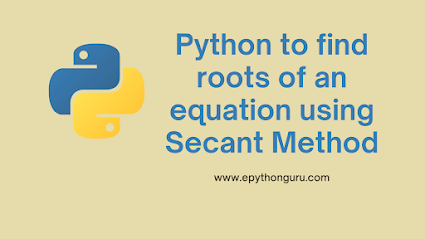Python to find roots of an equation using Secant Method
Python to find roots of an equation using Secant Method
.png)
In this, you will learn how to find the roots of equations using Secant Method in Python Programming.
Secant Method
The second method is used to find the origin of the equation
F (x) = 0. It starts from two different estimates, x1 and x2 for the root. It is a repetition process with linear interpolation to a source.
The iteration stops if the difference between the two intermediate values is less than the convergence factor.
Steps:
1. x1, x2, E, n // E = convergence indicator
2. Calculate f (x1), f (x2)
3. if (f (x1) * f (x2) = E); // Repeat the loop until convergence
4. Print the value of 'x0' // value of the root
5. Print the 'n' // iterations
5. Print the 'n' // iterations
else
6. Print "Source not found"
6. Print "Source not found"
In this Python program, x0 & x1 are the two initial estimation values, e is the tolerable error and f (x) is the actual non-linear function whose root is obtained using the second method. Variable x2 has approximately root in each step.
Example 1: Program to find the solution of equation x2-9 using secant method
Python Code:
from pylab import *
def secant(f,x0,x1,eps):
f_x0=f(x0)
f_x1=f(x1)
iteration_counter=0
while abs(f_x1)>eps and iteration_counter<100:
try:
x2 = float(f_x1-f_x0)/(x1-x0)
x = x1-float(f_x1)/x2
except:
print("error")
x0 = x1
x1 = x
f_x0=f_x1
f_x1=f(x1)
iteration_counter+=1
if abs(f_x1)>eps:
iteration_counter-=1
return x, iteration_counter
def f(x):
return x**2-9
x0 = 10
x1 = x0 - 1
solution, no_iterations=secant(f,x0,x1,eps=0.00001)
if no_iterations>0:
print("number of function call: %d" %(2+no_iterations))
print("solution is:", solution)
else:
print("solution is not found")Output:number of function call: 9
solution is: 3.000000000915234
Example 2: Program to find the solution of equation x3-4 using secant method
Python Code:
from pylab import *
def secant(f,x0,x1,eps):
f_x0=f(x0)
f_x1=f(x1)
iteration_counter=0
while abs(f_x1)>eps and iteration_counter<100:
try:
x2 = float(f_x1-f_x0)/(x1-x0)
x = x1-float(f_x1)/x2
except:
print("error")
x0 = x1
x1 = x
f_x0=f_x1
f_x1=f(x1)
iteration_counter+=1
if abs(f_x1)>eps:
iteration_counter-=1
return x, iteration_counter
def f(x):
return x**3-4
x0 = 10
x1 = x0 - 1
solution, no_iterations=secant(f,x0,x1,eps=0.00001)
if no_iterations>0:
print("number of function call: %d" %(2+no_iterations))
print("solution is:", solution)
else:
print("solution is not found")
Output:
number of function call: 13
solution is: 1.5874010554986935

.png)


.png)
.png)